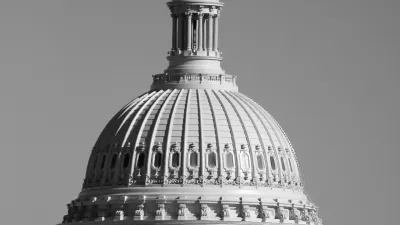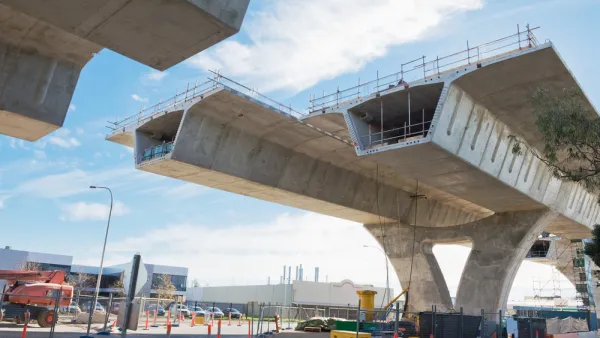A five-year transportation bill has advanced in the House, but it has a long way to go before Americans should expect to see a final federal transportation policy emerge from Congress.

"Democrats on a House committee voted late Thursday to send a far-reaching transportation bill to the full House, a key milestone in a process that faces an uncertain future," reports Michael Laris.
The five-year, nearly $500 billion funding bill, called the Invest in America Act, moves from the House Transportation Committee after two days of debate, according to Laris.
Transportation Committee Chairman Peter A. DeFazio (D-Ore.) is touting the bill as progress toward a more environmentally-friendly approach to transportation planning and investment in the United States. According to Laris's explanation, the bill "puts more importance on maintaining failing roads and bridges than on building new highway capacity, and has as a central goal of reducing transportation-related pollution, the nation’s top source of greenhouse gases causing climate change."
Republicans on the committee oppose the new direction reflected in the bill, calling it the "My Way or the Highway Bill."
Advocates like Yonah Freemark, on the other hand, have criticized the bill for spending far more on highways than on public transit, making it a climate bill in soundbites only. The New Urban Mobility alliance (NUMO), a coalition joining Lime, Lyft, the North American Bikeshare Association, Spin, Transit app, TransitScreen, Transportation for America, Uber and Via, sent to a letter to Congress before the bill passed committee asking for the five-year bill to do more in ensuring safe, equitable access to public transit and micomobility.
As noted by Laris, the House version of the bill is likely to undergo some significant changes to reconcile with any bill likely to pass in the Senate.
FULL STORY: Sweeping transportation bill, with focus on cutting pollution, sent to full House

Analysis: Cybertruck Fatality Rate Far Exceeds That of Ford Pinto
The Tesla Cybertruck was recalled seven times last year.

National Parks Layoffs Will Cause Communities to Lose Billions
Thousands of essential park workers were laid off this week, just before the busy spring break season.

Retro-silient?: America’s First “Eco-burb,” The Woodlands Turns 50
A master-planned community north of Houston offers lessons on green infrastructure and resilient design, but falls short of its founder’s lofty affordability and walkability goals.

Test News Post 1
This is a summary

Analysis: Cybertruck Fatality Rate Far Exceeds That of Ford Pinto
The Tesla Cybertruck was recalled seven times last year.

Test News Headline 46
Test for the image on the front page.
Urban Design for Planners 1: Software Tools
This six-course series explores essential urban design concepts using open source software and equips planners with the tools they need to participate fully in the urban design process.
Planning for Universal Design
Learn the tools for implementing Universal Design in planning regulations.
EMC Planning Group, Inc.
Planetizen
Planetizen
Mpact (formerly Rail~Volution)
Great Falls Development Authority, Inc.
HUDs Office of Policy Development and Research
NYU Wagner Graduate School of Public Service



























